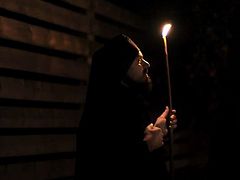Polemics has a rather bad name—perhaps not surprisingly, since it comes from the Greek word polemos, meaning “war”. Some people in particular are distressed when they see in Christian writers anything polemical or negative. Why, they ask, do these Christian writers have to denounce certain trends and ideas? Can’t we all just be positive, upbeat, and encouraging? After all, Jesus preached a Gospel of love. Can’t we just speak about things that are true without denouncing things that are false? Often such criticism of polemics combines with a kind of ad hominem attack, in which the polemical writer is reproached for a lack of charity, sympathy, and general kindness, and is portrayed as a misanthrope and as deficient in Christian spirit—despite the fact that the person launching the ad hominem broadside has no personal knowledge of the polemical writer whatsoever.
There is some value to a reluctance to engage in polemics. St. Paul cautions that the Lord’s servant must not be quarrelsome (2 Timothy 2:24), and must avoid stupid controversies which would be unprofitable and futile (Titus 3:9). St. James reminds us the wise man should show his wisdom in meekness, and that true wisdom is peaceable, gentle and open to reason (James 3:13,17). We all know of people who love to quarrel and are always spoiling for a fight, people who love nothing better than to correct everyone else. When we meet them online, we refer to them as “trolls”. Long familiarity with them is enough to give anyone second thoughts about the value of polemics.
But polemics in Christianity are not so easily rejected. Trolls can misuse it, but the misuse does not invalidate a proper use. The proper use we see in the words of the apostles. That is because it is not enough to simply speak the positive truth, and say that 2 + 2 = 4. Sadly the world is full of people who cannot help listening to the anti-Christian propaganda which floods our culture, and who therefore will believe that 2 + 2 also equals 5 as well. It is not logical, of course, to believe at the same time two things which are mutually contradictory and incompatible, but multitudes of people do it nonetheless. That is why good people need not only to be given the truth that 2 + 2 = 4, but also the complementary truth that 2 + 2 does not equal 5. They need not only to be given the positive truth, but also a warning not to receive error.
That is why the apostles in their epistles spent so much time warning others against error and sin. They did not simply say who Jesus was and counsel works of righteousness. They also said not to listen to those who would distort the truth about Jesus and warned them against particular acts of sin. The apostolic faith is polemical at its heart. If you doubt this, try this experiment: go through the New Testament epistles and underline everything negative, every verse in which St. Paul warns his readers to avoid error and denounces sin and heresy. You will be doing a lot of underlining.
For example, in his epistle to the Romans Paul argues with the Jews at great length; in his epistle to the Corinthians he denounces his detractors as “false apostles”, as Satan’s servants; in his epistle to the Galatians he insists that those who reject his teaching about circumcision have been severed from Christ, and fallen away from grace; in his epistle to the Philippians he calls his adversaries “dogs”, “evil-workers”, “mutilators”; in his epistle to Timothy he names names, and says to beware of “Hymenaeus and Alexander, whom I have delivered to Satan [i.e. excommunicated] that they may learn not to blaspheme” (1 Timothy 1:20).
And it is not just St. Paul, as if the apostle to the Gentiles were something of a humbug. St. James also denounces sin and sinners, telling them to weep and howl for the miseries coming upon them (James 5:1). St. Peter warns against sin, sinners, and heretics, describing the offenders as “bold and wilful” and as “accursed children” (2 Peter 2:10f). St. Jude’s epistle consists entirely of warning against heresy, and he describes the heretics as “waterless clouds, fruitless trees, wild waves of the sea, casting up the foam of their own shame, wandering stars for whom the nether gloom of darkness has been reserved forever” (Jude 12-13). Even St. John, the apostle of love, writes that his readers must beware of false teachers, whom he stigmatizes as “antichrists” (1 John 2:18f), and he commands his flock to have nothing to do with them—not even to let them into their houses or give them a greeting (2 John 10f).
It is not as if such vociferous denunciations of sin were something foreign to the faith. Indeed, one might say that it was from Christ Himself that the apostles learned of such zeal. Christ’s denunciations of the opposing Pharisees as hypocrites, children of hell, whited sepulchres, serpents and broods of vipers are well-known (see Matthew 23:13, 15, 27, 33). Those who suggest that Christianity is about love, love, and only love speak the truth, but they do not know what love really entails. Christ and His apostles did not make such fearful denunciations in a fit of pique, but to warn off their hearers from the doom which awaited them if they refused to repent.
It is no good then demanding that polemics be avoided in Christian writing, for apostolic Christianity is polemical at its core. We should not delight in giving offense, but we dare not avoid it when it is necessary. After all, squeamishness is not one of the fruits of the Spirit. As Dorothy Sayers once said, (in her piece Creed or Chaos?), it is “a grave mistake to present Christianity as something charming and popular with no offense in it. Seeing that Christ went about the world giving the most violent offense to all kinds of people it would seem absurd to expect that the doctrine of his person can be so presented as to offend nobody”. There is nothing for it: polemics are an unavoidable component to the Christian Faith. This should not be surprising, for we are all Christian soldiers, and the Church is a Church which is spiritually at war.




